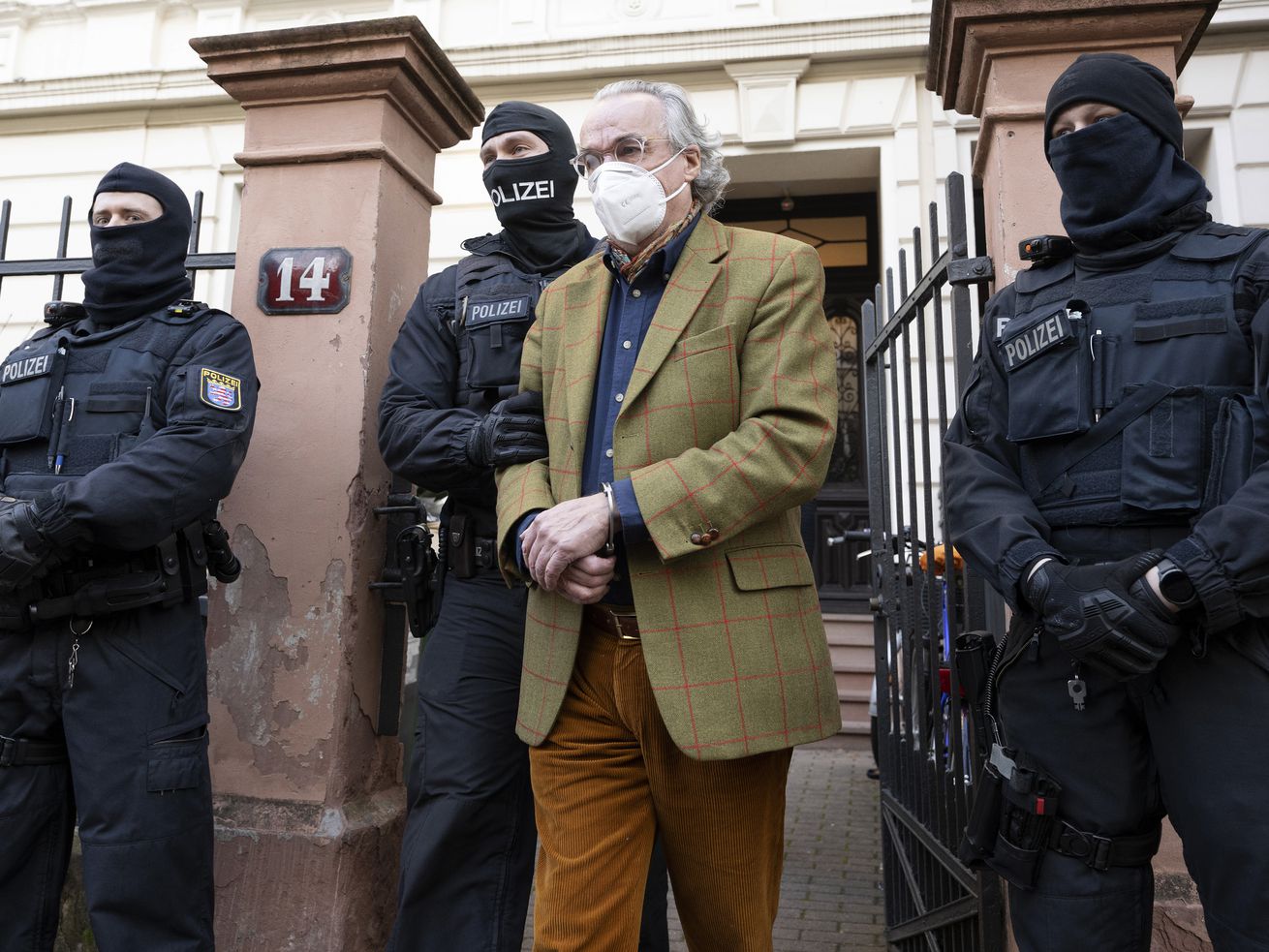Understanding the Reichsbürger, a QAnon-influenced radical movement that just tried to make a minor noble the new king of Germany.
It sounds like something out of a novel: a cell of heavily armed German extremists plotting to overthrow the elected government and elevate a man called Prince Heinrich XIII to the throne of a new Teutonic monarchy.
On Wednesday, German police arrested 25 people attempting to do exactly that — including a former member of parliament from Alternatives for Deutschland (AfD), a far-right anti-immigrant faction.
The plot originated out of a movement called the Reichsbürger — literally, “Reich citizens.” They believe that every German state since World War I has been illegitimate, a corporation rather than an authentic government, and thus feel entitled to ignore its laws. It’s not the first time the group has been implicated in a violent incident. In 2016, one alleged member killed a Bavarian policeman; in 2020, Reichsbürger adherents participated in an attempt to storm the German capitol during a protest against Covid restrictions. But a sizable armed cell plotting a coup takes the dalliance with violence to a whole new level (even though Heinrich isn’t much of a prince).
To try to understand this bizarre incident and the movement behind it, I reached out to Peter Neumann, a professor of security studies at King’s College London and a leading expert on terrorism in Germany. Neumann has been studying the Reichsbürger for over a decade, which he learned of by researching an older movement that existed in America — so-called “sovereign citizens” who believe that the 14th Amendment (or possibly the end of the gold standard) secretly overturned the US Constitution, and that they are under no obligation to obey America’s laws.
“I first took an interest in this when I was teaching at Georgetown, 12 years ago. I learned about the sovereign citizens in the United States,” he says. “I didn’t know that we had a similar movement in Germany, where I come from.”
Recently, Reichsbürger adherents have started taking on ideas from another American conspiracy theory: QAnon, the idea that Donald Trump is leading a secret campaign against a cabal of Satanic pedophiles who run the world. Somehow, according to Neumann, this peculiarly American theory has become a major part of the German extremist landscape.
“The second most used language in QAnon chat rooms on Telegram is German. The second most translated language of QAnon videos and documents is German,” he says.
This may all sound ridiculous, but Neumann warns that we should take the Reichsbürger seriously.
“The Reichsbürger — they are heavily armed,” he tells me. “It’s not the 25 people per se that were arrested; it’s the probably thousands of people behind that following the same ideology, and that may have felt empowered and inspired by this.”
A transcript of my December 8 conversation with Neumann follows, edited for length and clarity.
Zack Beauchamp
Let’s start with the most basic questions: What do the Reichsbürger believe, and how did a prince get wrapped up in their coup plot?
Peter Neumann
Through my study of the “sovereign citizen” movement in the United States, I eventually ended up looking at the Reichsbürger in Germany. There are a lot of very striking similarities.
Both basically argue that the state, in its current manifestation, is illegitimate. In Germany, they argue that the state is in fact a company: It doesn’t have to be recognized; you don’t have to accept anything that comes from the state, including any fines or taxes you have to pay. [The Reichsbürger] also do their own passports, and identity documents, and driving licenses.
What [the Reichsbürger] are saying is the last valid German state was under the Kaiser, basically an aristocratic form of government. Every German state that came into existence after that is invalid for different reasons, but they’re all invalid. They’re all illegitimate. Basically, what they are trying to recreate, what they are trying to go back to, is essentially a monarchical system — the monarchy [that] ended in Germany with the defeat in World War I.
As a consequence, they do sometimes attract these failed aristocrats who are still aggrieved about the end of the monarchy over 100 years ago. I think it makes sense, from their ideological point of view, to say, “The new head of state has to be some kind of prince, has to be some sort of person with an aristocratic line.”
[Prince Heinrich XIII’s] aristocratic lineage is very modest: I don’t think he would’ve gone very far under the emperor, before 1918. From their point of view, this is probably still better than nothing.
Zack Beauchamp
This is all wild — honestly, it sounds ridiculous. But at the same time, it inspired 25 heavily armed people to attempt to overthrow the German government. That’s not so ridiculous.
How do you balance the seemingly absurd presentation of all of this with the seriousness of the threat?
Peter Neumann
You balance it by talking about the numbers of people that this movement has attracted over the past few years.
The German security agencies only really got interested in this phenomenon of the Reichsbürger, or sovereign citizens, in 2016 — [when] a policeman was killed in Bavaria because they wanted to search the property of a supporter of the movement. Suddenly, people started asking questions: Why was that policeman killed? Why did the guy have a weapon? What was that search about?
As a result of that, for the first time we discovered that there was such a thing as the sovereign citizen movement [in Germany]. Security agencies started digging, and at the beginning of 2016, they said, “They have a few hundred supporters.” Only two or three years later, they actually came to the conclusion that they were probably up to 20,000 supporters across the country.
That’s not because, in those three years, the number increased so much. It’s because no one had looked for them and categorized them as a separate category before. It became obvious that there was a whole movement that had existed beyond that, that hadn’t been looked at before.
Then [the pandemic] came. The lockdowns and the rules around masks and vaccinations were, of course, a complete boon for the movement.
We had some big demonstrations, some big protests in Berlin, which mobilized up to 100,000 people. At none of these protests were the Reichsbürger dominant, but they were always present there, and they were always trying to recruit people and forging alliances with other groups, typically on the far right. The pandemic really allowed them to broaden their movement even beyond that; there’s certainly a sense that, over the past two and a half years, this movement has become much more structured and much better connected. There are Telegram groups which bring these people together.
Yes, we only had these 25 people arrested, and by itself, it doesn’t look like very much. [But] they have supporters. It’s not the 25 people per se that were arrested; it’s the probably thousands of people behind that following the same ideology, and that may have felt empowered and inspired by this.
There’s one other important fact: The sovereign citizens, the Reichsbürger, they are heavily armed. Many of the people whose houses have been searched had a dozen guns stored in their basement, which, in Germany, is very unusual.
In that sense, there is a legitimate reason to be worried about this movement — not only in terms of the numbers, but also because of the fact that they are heavily armed.
Zack Beauchamp
In the United States, a lot of the reporting about the Reichsbürger coup plot has focused on the way the movement has adopted some QAnon beliefs. That seems so strange to me: QAnon is such a particularly American phenomenon, centering on a conspiracy theory in which a godlike Donald Trump saves the country from pedophiles. Somehow, it appears to have been exported to Germany (and to other countries)
How did that work?
Peter Neumann
I have to say, Zack, when QAnon first came up, I thought, “This will never translate into any other national context.” It’s about Donald Trump, it’s about the Second Amendment, it’s about a lot of things that are uniquely and specifically American, that don’t translate into other contexts. For some reason, which I still haven’t completely figured out, it seems to have translated very well into the German context.
We know, for example, that the second most used language in QAnon chat rooms on Telegram is German. The second most translated language of QAnon videos and documents is German. I myself follow a lot of German QAnon Telegram channels; a lot of people seem to be very fascinated by it.
I don’t know of any personal, physical connections between leaders of the movements, but there certainly seems to be a lot of inspiration. Once they understand and accept that a lot of this comes out of an American context, they are trying to find ways to translate it into a German context.
In August 2020, there was an attempt to storm the Reichstag, the German parliament. It was in the context of a demonstration — 100,000 people in the streets of Berlin. Some of these Reichsbürger were actually trying to enter the building, just like the Capitol [on January 6]. They basically afterward said that they’d been convinced that Donald Trump was in town, that he’d secretly flown to Berlin in order to liberate Germany. This was one of those rumors that was spread on QAnon follower Telegrams.
There’s a pretty major difference [between Germany and the US]: The center-right party in Germany has nothing to do with any of this. There’s no Marjorie Taylor Greene, there’s no Donald Trump in Germany who would promote that.
Zack Beauchamp
But what about AfD, Germany’s relatively popular far-right party?
Peter Neumann
Apparently, one of the 25 coup plotters was a former member of parliament for the AfD.
The AFD actually started out [wanting to be] respectable, but the AFD of the past five years in particular has radicalized quite significantly. [Reichsbürger ideology] is still not mainstream within the AFD, but I think it’s tolerated now. There are supporters, especially among staff in the AFD, in the German parliament — I’ve seen them tweet out stuff that is essentially Reichsbürger stuff. You’ve had comments from AfD members of parliament basically saying, “Germany is not really a state, it’s a company,” which is exactly the ideological line that you hear from the Reichsbürger. You do have that on the margins of the AFD, and I do think that is a real concern.
If the AFD was smart, which it isn’t, I think they would come out very strongly and say, “We distance ourselves from that, and we want nothing to do with that.” They are not doing that because they probably understand, just like Trump in America probably understands, that being ambiguous about it allows them to have their cake and eat it.
Zack Beauchamp
One other thing I’ve been wondering about: Normally, when we talk about far-right extremism in Germany, we’re talking about neo-Nazis. There’s been a lot of discussion about, for example, neo-Nazi infiltration of the military and the police in the past few years.
But the Reichsbürger ideology and the neo-Nazi ideology are incompatible. One says, “It’s the Nazi state we should return to,” and the other says, “No, the Nazis were illegitimate, too, we need to go back to the days of the Kaiser.”
How do these movements interact, if they do at all, in the Telegram channels that you watch?
Peter Neumann
Before [the pandemic], I think you would’ve had fairly separate groups that had different aims. During the pandemic, and during the mobilization against the lockdown, the lines blurred — some of these groups were happy to talk to each other, to network amongst each other. I think the idea of opposition to the lockdown united them to some extent. That’s been the consequence of these big protests: People were meeting each other, people were making connections, new alliances were formed, and to some extent, that’s been the outcome of that.
I think they’re still separate groups, and this is what confused security agencies in Germany for a long time — why they started looking at [Reichsbürger] so late.
We have a very fixed idea of what a far-right extremist looks like, because of our history. A far-right extremist is a neo-Nazi; anything that doesn’t fit into that box of neo-Nazi or fascist, we have problems with, and we don’t recognize. Up until they [the Reichsbürger] killed that policeman in Bavaria, most intelligence agencies basically had them under the category of nutcases, crazies. But they had their own far-right, albeit separate, ideology — a very strange ideology.
Author: Zack Beauchamp
Read More



